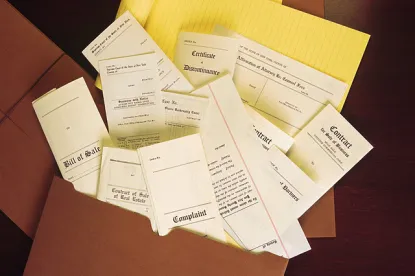By no means do we think that we might reliably predict the outcome of such a politically charged case as King v. Burwell, No. 14-114, the latest challenge to the Affordable Care Act.
But for those who like to read tea leaves from the Supreme Court, section III.B.2 of the Court’s decision (released yesterday) in Baker Botts LLP v. Asarco LLC, No. 14-103, might be worth paying attention to. The upshot of Baker Botts is that the law firm could not recover attorneys’ fees incurred in defending its fee application in bankruptcy because § 330(a)(1) of the Bankruptcy Code does not authorize bankruptcy courts to award fees for defending fee applications.
Justice Thomas wrote for the Court (with a majority consisting of himself, Chief Justice Roberts, and Justices Scalia, Kennedy, and Alito), and Justice Sotomayor wrote a one-paragraph concurrence, joining all but section III.B.2 of the Court’s decision.
What was so objectionable about section III.B.2? It addressed the government’s dire predictions for the bankruptcy bar if the Court would not permit Baker Botts to recover the fees at issue, and, in the section’s penultimate paragraph, the Court—that is, those five justices in the majority—flatly rejected arguments that “substitut[e] policy-oriented predictions for statutory text.” Slip op., at 12.
Here is the paragraph in full:
More importantly, we would lack the authority to rewrite the statute even if we believed that uncompensated fee litigation would fall particularly hard on the bankruptcy bar. “Our unwillingness to soften the import of Congress’ chosen words even if we believe the words lead to a harsh outcome is longstanding,” and that is no less true in bankruptcy than it is elsewhere. Lamie v. United States Trustee, 540 U.S. 526, 538 (2004). Whether or not the Government’s theory is desirable as a matter of policy, Congress has not granted us “roving authority . . . to allow counsel fees . . . whenever [we] might deem them warranted.” Alyeska Pipeline, supra, at 260. Our job is to follow the text even if doing so will supposedly “undercut a basic objective of the statute,” post, at 3. Section 330(a)(1) itself does not authorize the award of fees for defending a fee application, and that is the end of the matter.
Slip op., at 12-13.
It’s not hard at all to imagine the Court’s using a similar rationale to deal with arguments concerning the dire consequences of the literal interpretation proposed by the opponents of the Affordable Care Act in King.
Justice Breyer wrote a dissenting opinion in Baker Botts, in which Justices Ginsburg and Kagan joined. Add Justice Sotomayor to that list of dissenters, and one wonders if that might be the way the votes fall in King.
Only time will tell.




 />i
/>i
